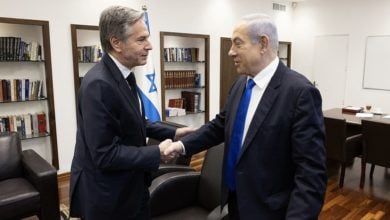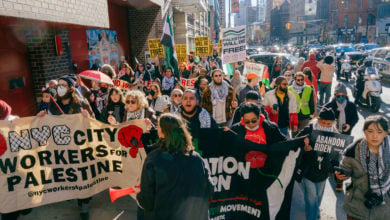Colombian unionists continue lawsuit against Coke
THE Colombian union Sinaltrainal, representing food and beverage workers, is appealing the dismissal of a lawsuit against Coca-Cola and four bottling companies. The lawsuit charges that Coke managers conspired with paramilitary forces to murder, threaten and torture trade unionists at its plants.

In September, a U.S. district court dismissed the lawsuit, claiming Sinaltrainal “lacked jurisdiction.” Javier Correa, president of Sinaltrainal, announced the plans to appeal the decision to the 11th U.S. Circuit Court of Appeals in Atlanta.
“We are sure we’ll win because the facts of the case speak for themselves and nobody has yet been brought to justice,” Correa told the Associated Press on Nov. 3.
Colombia is the world’s most dangerous country for trade unionists. Of the almost 800 registered union killings since 2000, the government has only prosecuted a handful of cases.
While U.S. courts are no friends to workers—in Colombia or in the United States—the lawsuit against Coke has raised awareness about the U.S.-backed Colombian government’s anti-worker campaign. Many U.S. unions now boycott Coca-Cola products in solidarity with Sinaltrainal.
Jury declares mistrial in FARC trial

On Nov. 21, a Washington, D.C. jury declared a mistrial in the case against Revolutionary Armed Forces of Colombia People’s Army (FARC-EP) leader Ricardo Palmera, better known as Simon Trinidad. Trinidad, pictured here in U.S. military custody, is the most senior FARC-EP member to be captured.
After Trinidad was deported to the United States in 2004, the U.S. government charged him with hostage taking, conspiracy and supporting terrorism. The charges were related to the FARC-EP’s capture of three U.S. contractors after a 2003 plane crash.
Trinidad faces up to 30 years in prison.
Trinidad testified that he had never seen the three mercenaries. He described the FARC-EP as a noble and peaceful organization, according to a Nov. 21 Associated Press report.
After five weeks of testimony and one day of deliberation, the jurors declared themselves deadlocked. U.S. prosecutors vowed to start a new trial by the end of the year.
The FARC-EP is demanding Trinidad’s release as part of a prisoner exchange. It is offering to release 62 captives—including the three U.S. mercenaries—in return for the Colombian and U.S. governments’ release of over 500 FARC-EP members and supporters.
Bolivia issues land reform, nationalizes gas
On Nov. 29, Bolivian President Evo Morales signed a historic land reform bill. The law gives the government power to seize unproductive land and turn it over to landless Indigenous peasants.

Morales is the first-ever Indigenous president in Bolivia, despite the fact that the majority of the population is Indigenous.
Up to a fifth of the country’s land, or 77,000 square miles, is now in the hands of the country’s landowning class and is idle or fraudulently obtained, according to the Associated Press.
The ruling elite is trying to build opposition to Morales’s government. So far, that opposition has centered in the wealthy Santa Cruz region. Big landowners have begun to form private militias to defend “their” land.
On Dec. 3, Morales also signed a law nationalizing the country’s natural gas resources. That follows his government’s May 1 nationalization of the petroleum resources.
But the Indigenous majority is also organizing. “This is the struggle of our ancestors, the struggle for power and territory,” Morales told the crowd after signing the bill. “Now, the change is in our hands.”
Jim West
Photo: Carlos Pinto/Afp/Getty Images
Photo: Reuters/David Mercado





